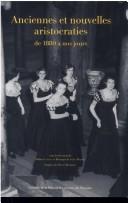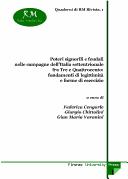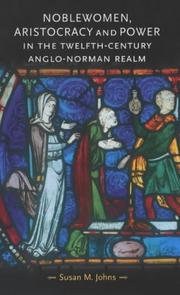| Listing 1 - 6 of 6 |
Sort by
|

ISBN: 2735118509 273511371X 2735109380 Year: 2007 Publisher: Éditions de la Maison des sciences de l’homme
Abstract | Keywords | Export | Availability | Bookmark
 Loading...
Loading...Choose an application
- Reference Manager
- EndNote
- RefWorks (Direct export to RefWorks)
Sans rien ignorer des spécificités de différentes aristocraties, anciennes et nouvelles, et des groupes qui les constituent, les auteurs de cet ouvrage tentent plutôt de les confronter, de rechercher les caractères communs qui les soudent, les différences qui les séparent et, plus encore, les fondements de clivages souvent ambigus entre aristocrates et non-aristocrates. Leur ambition est tout à la fois de présenter des études de cas précises réalisées en France, Grande-Bretagne, Allemagne, Italie, Hongrie, Finlande et Suède, un état des lieux ainsi que des recherches sur les noblesses menées par historiens, anthropologues et sociologues et enfin de proposer une analyse critique et comparative des évolutions de ces noblesses. Quel est le poids du symbolique mais aussi des décrochements politiques dans les transformations: disparition, désagrégation et parfois recomposition des anciennes aristocraties et constitution de nouvelles aristocraties ? Comment appréhender le phénomène aristocratique dans son extension européenne ? Comment articuler étude des tensions entre appartenances contradictoires - nationale et européenne, nobiliaire et démocratique - dans lesquelles sont parfois enserrés les aristocrates, et analyse des modes de reproduction de ces groupes ? Ce sont quelques-unes des questions majeures abordées dans ce livre.
Nobility --- Aristocracy (Social class) --- Elite (Social sciences) --- Social classes --- Social history --- History. --- Descriptive sociology --- Social conditions --- Elites (Social sciences) --- Aristocracy --- Aristocrats --- History --- Sociology --- Leadership --- Power (Social sciences) --- Social groups --- Upper class --- aristocratie --- XXème siècle --- Europe --- noblesse --- XIXème siècle
Book
ISBN: 1107120624 1107543584 1316667359 1316343057 9781316667804 1316667804 9781316343050 1316667952 9781107120624 9781107543584 1316667200 9781316667354 9781316667200 9781316667958 Year: 2016 Publisher: Cambridge : Cambridge University Press,
Abstract | Keywords | Export | Availability | Bookmark
 Loading...
Loading...Choose an application
- Reference Manager
- EndNote
- RefWorks (Direct export to RefWorks)
Who thought of Europe as a community before its economic integration in 1957? Dina Gusejnova illustrates how a supranational European mentality was forged from depleted imperial identities. In the revolutions of 1917 to 1920, the power of the Hohenzollern, Habsburg and Romanoff dynasties over their subjects expired. Even though Germany lost its credit as a world power twice in that century, in the global cultural memory, the old Germanic families remained associated with the idea of Europe in areas reaching from Mexico to the Baltic region and India. Gusejnova's book sheds light on a group of German-speaking intellectuals of aristocratic origin who became pioneers of Europe's future regeneration. In the minds of transnational elites, the continent's future horizons retained the contours of phantom empires. This title is available as Open Access.
Supranationalism --- Imperialism --- Transnationalism --- Elite (Social sciences) --- Intellectuals --- Aristocracy (Social class) --- History --- Social aspects --- Europe --- Germany --- Politics and government --- Intellectual life --- Aristocracy --- Aristocrats --- Upper class --- Nobility --- Elites (Social sciences) --- Leadership --- Power (Social sciences) --- Social classes --- Social groups --- Trans-nationalism --- Transnational migration --- International relations --- Colonialism --- Empires --- Expansion (United States politics) --- Neocolonialism --- Political science --- Anti-imperialist movements --- Caesarism --- Chauvinism and jingoism --- Militarism --- World politics --- General

ISBN: 8884532558 888453254X Year: 2005 Volume: 1 Publisher: Firenze University Press
Abstract | Keywords | Export | Availability | Bookmark
 Loading...
Loading...Choose an application
- Reference Manager
- EndNote
- RefWorks (Direct export to RefWorks)
This volume contains the proceedings of the study convention held in Milan on 11 and 12 April 2003. The objective of these study days was to address the question of the powers of lordship which were exercised in the countryside of central-northern Italy between the mid fourteenth century and the end of the fifteenth century. The discussions focused on what instruments and what foundations of legitimacy these same powers had and what was their relationship with the authority of the prince and with the ordinary citizen, on the one hand, and with the community and the homines on the other. These and various other issues thrown up by the study of feudal power are the topics which emerge in the various contributions gathered in this volume, devoted principally to the Lombardy of the Visconti and the Sforza, but also to other areas of Italy.
Feudalism --- Aristocracy (Social class) --- History --- Italy, Northern --- Aristocracy --- Aristocrats --- Feudal tenure --- Northern Italy --- Upper class --- Nobility --- Civilization, Medieval --- Land tenure --- Land use --- Land use, Rural --- Chivalry --- Estates (Social orders) --- Feudalesimo --- Italia centro-settentrionale --- Sec. 14.-15. --- -Congressi --- 2005 --- Rural conditions --- Comuni medievali --- Open Access --- Storia --- Signorie --- Medioevo --- Italia
Book
ISBN: 2821895836 9568416072 9789568416071 Year: 2007 Publisher: Santoago : Ariadna Ediciones,
Abstract | Keywords | Export | Availability | Bookmark
 Loading...
Loading...Choose an application
- Reference Manager
- EndNote
- RefWorks (Direct export to RefWorks)
Detailed description of the lifestyle of groups of high Chilean society in the late 19th and early 20th century, and its social and political role. The theoretical contribution of this book is to show through the analytical practice that the study of class consciousness requires taking culture as a historical object. There is an almost implicit postulate in the work: it is important but not sufficient to situate a class in relation to the economic structure. Of course, it is required to know the material conditioning, the type of social relations of production of which a certain class is agent; and for that reason in this book the description of the economic functions of the oligarchy is central. But between the economic situation of class and consciousness there is a specific field of mediations, which is culture. That culture is more than language, discourse, theory or ideas; she is a type of practice that is apprehended through the concept of way of being (from the Prologue of Tomás Moulian).
Communism --- Bolshevism --- Communist movements --- Leninism --- Maoism --- Marxism --- Trotskyism --- Collectivism --- Totalitarianism --- Post-communism --- Socialism --- Village communities --- History --- Sources. --- Chile --- Soviet Union --- Relations --- Upper class --- Aristocracy (Social class) --- History. --- Civilization. --- Fashionable society --- High society --- Society, High --- Upper classes --- Social classes --- Aristocracy --- Aristocrats --- Nobility

ISBN: 0719063051 0719063043 9786610734276 1847790534 1781700281 1280734272 1417590548 9781526137555 9781781700280 9781847790538 9781417590544 9780719063046 9780719063053 9781280734274 Year: 2003 Publisher: Manchester : Manchester university press,
Abstract | Keywords | Export | Availability | Bookmark
 Loading...
Loading...Choose an application
- Reference Manager
- EndNote
- RefWorks (Direct export to RefWorks)
This is the first study of noblewomen in twelfth-century England and Normandy, and of the ways in which they exercised power. It draws on a rich mix of evidence to offer an important reconceptualisation of women's role in aristocratic society, and in doing so suggests new ways of looking at lordship and the ruling elite in the high middle ages. The book considers a wide range of literary sources such as chronicles, charters, seals and governmental records to draw out a detailed picture of noblewomen in the twelfth-century Anglo-Norman realm. It asserts the importance of the life-cycle in determining the power of these aristocratic women, thereby demonstrating that the influence of gender on lordship was profound, complex and varied. This work will be of importance to specialists in history and medieval studies, as well as those interested in the experience of women and those working on lordship and feudalism.
Women - Great Britain - History - Middle Ages, 500-1500. --- Women --- Aristocracy (Social class) --- Power (Social sciences) --- Nobility --- Normans --- Gender Studies & Sexuality --- Gender & Ethnic Studies --- Social Sciences --- History --- Political activity --- Great Britain --- History. --- Social class. --- Aristocracy --- Aristocrats --- Human females --- Wimmin --- Woman --- Womon --- Womyn --- Upper class --- Females --- Human beings --- Femininity --- Empowerment (Social sciences) --- Political power --- Exchange theory (Sociology) --- Political science --- Social sciences --- Sociology --- Consensus (Social sciences) --- engalnd --- normandy --- norman --- noblewoman --- Dower --- Land tenure --- england
Book
ISSN: 12552364 ISBN: 9782753552593 2753552592 2753585016 Year: 2017 Publisher: Rennes: Presses universitaires de Rennes,
Abstract | Keywords | Export | Availability | Bookmark
 Loading...
Loading...Choose an application
- Reference Manager
- EndNote
- RefWorks (Direct export to RefWorks)
"Noblesse oblige." La maxime du duc Pierre-Marc-Gaston de Lévis (1764-1830) est passée dans le langage courant pour évoquer les obligations morales qui pèsent sur les détenteurs d'un nom, et plus généralement pour inviter tous les prétendants à la respectabilité à adopter un comportement conforme à la dignité qu'ils revendiquent. L'idée n'était pas nouvelle. En 1665, dans son Dom Juan, Molière plaçait déjà dans la bouche de Dom Louis une tirade véhémente devenue fameuse : "Non, non, la naissance n'est rien où la vertu n'est pas." Si la noblesse reposait sur la vertu, quelle définition donnait-on à cette qualité ? S'agissait-il du courage guerrier, de l'exemplarité morale ou de l'appartenance au monde des gens de bien ? Vivre de ses rentes ne suffisait plus pour être reconnu comme noble dans une société où, à partir du XVIIe siècle, le roi s'imposa comme le maître des identités. Sous une unité de façade, quelles failles économiques, culturelles et idéologiques traversaient la noblesse à l'époque moderne ? À quelles obligations, surtout, se sentait-elle tenue, et quelles formes prenaient les engagements politiques, religieux et partisans qui l'animaient ? Quel était le sens des termes "vocation" ou "service" pour les seigneurs et les dames de l'Ancien Régime ? C'est à ces questions, et à quelques autres, que ce volume propose des éléments de réponse, non par une approche systématique de la noblesse en tant qu'ordre ou catégorie sociale illusoire, mais à travers une analyse fondée sur l'examen de traces, de textes et d'archives, qui permettent de brosser un panorama de la société des princes et des princesses, des seigneurs et des capitaines, des nobles d'épée et des courtisans, entre le temps de la Renaissance et l'aube du XIXe siècle
Nobility --- Aristocracy (Social class) --- Group identity --- Group values (Sociology) --- Social values --- Collective identity --- Community identity --- Cultural identity --- Social identity --- Identity (Psychology) --- Social psychology --- Collective memory --- Aristocracy --- Aristocrats --- Upper class --- Noble class --- Noble families --- Nobles (Social class) --- Peerage --- Titles of honor and nobility --- History. --- Political activity --- Noblesse --- Identité collective --- History of civilization --- anno 1500-1799 --- --Europe --- --XVIe-XVIIIe s., --- History --- Political activity&delete& --- XVIe-XVIIIe s., 1501-1800 --- Europe --- Identité collective --- noblesse --- société --- histoire moderne
| Listing 1 - 6 of 6 |
Sort by
|

 Search
Search Feedback
Feedback About UniCat
About UniCat  Help
Help News
News